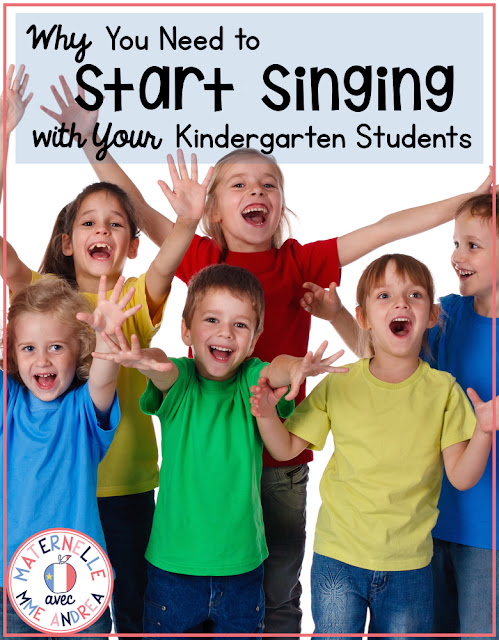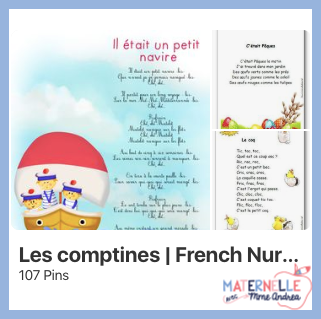Rhyming is fun, and knowing how to rhyme is very important for anyone wanting to learn to read.
Last week, I shared with you how much little Andrea loved to rhyme, and how crazy she drove her parents with The Name Song (along with begging for 100 bedtime stories per night, most of which rhymed).
(If you missed it, you can read more about that HERE.)
I also explain how (according to a quick Google search – I did not personally do any research/check the validity/sources of this statement), fewer and fewer kids are starting school adept at rhyming, likely because fewer and fewer parents are teaching their children nursery rhymes and reading them lots of rhyme-y bedtime stories.
This is a problem for us maternelle teachers!
There is a correlation between rhyming mastery and reading readiness, so if we want our students to learn to read (and read well), we have got to make sure that they have rhyming down pat.
And, if they aren’t learning nursery rhymes at home with their parents at the same rate we did when we were growing up, I think that we teachers should step in and provide them with that opportunity.
EVEN IF YOU THINK YOU “AREN’T A GOOD SINGER”!!
Sooo many teachers tell me that they “can’t sing”.
I’m sorry, but SO?!??!
Your kinders don’t care, no one else can hear you, and comptines, chansons, and rhyming are WAY TOO IMPORTANT for your students to be missing out on.
So sing!!
If you still need convincing, read on for all of the reasons why you’ve got to be singing and chanting with your maternelle students (whether you think you’re a good singer or not!) 😉
(This post is specifically about teaching and practising rhymes via songs and poems – if you want to know more about why teaching our students to rhyme is so important in the first place, check out my first blog post in this mini rhyming series RIGHT HERE.)
We can teach SO MANY SKILLS via chansons and comptines and the rhythm and rhyme found within them.
Here are just some of the amazing benefits your students will receive:
- Listening skills – students need to hear the individual words within a poem or song in order to understand what it is about. They will also need to listen to you sing or recite it a few times before they will be able to join in
- Auditory discrimination – students will practice being able to identify individual words within a sentence or phrase, and the sounds within those words when looking for rhymes
- Practice predicting/anticipating rhyming words – students should become able to correctly predict a word that makes sense (and rhymes) to complete rhyming couplets within each poem or song
- Increased vocabulary exposure – songs and poems are full of new, rich vocabulary words that your students may not have heard before
- Rich range of language – poets and songwriters look for precise words that convey their exact meaning, and fit within the rhythm and rhyme of their pieces. These special, precise words may be new for your students – especially if French is their second language
- Concentration skills – students will need to focus to hear individual words and sounds within each song or poem, and they will need to concentrate in order to recite them on their own
- Poetry skills – the more they are exposed to poems and songs, the more students will naturally learn about syllables, line length, rhyme, and rhythm
- Rhythm of language – songs and poems are an especially great way for second language learners to hear how words and sounds are put together in the target language in meaningful and authentic ways. They will also be repeating certain sentence structures and verb tenses, which may help them speak more correctly in their second language, with less reflection needed
- Expression/animation in your voice while reading/reciting – we are always wanting our students to read fluently, with expression. Poetry is a great way for them to practice “reading like you speak” before they even begin to actually read
- Phonemic awareness – syllables, rhymes, sounds within words – so many phonemic awareness skills can be taught and practised via poems and songs
- Looking for/keeping a steady beat – poems and songs sound better when you stay on beat and keep the rhythm. Some evidence even shows that students who have practice with rhythm will become stronger math students!
- Memory/retelling skills as they learn songs and poems off by heart, even at a very young age – in the age of computers and smartphones and Google at our fingertips, we have to memorize less and less. Songs and poems are a great way to stretch your students’ brains and provide them with valuable memorizing practice!
- Ability to identify words that don’t rhyme (they will sound “wrong” if you put them in the poem)
- Ability to make up their own rhymes and chants
- Ability to invent silly nonsense words that rhyme
- Joy and fun with language and sounds
- Expanding their imagination as they visualize what is happening in the poem or song – this comprehension skill will serve them later in life, when they read chapter books and other texts that don’t have pictures
I think it’s pretty clear from the examples above that we would be doing a disservice to our students if we don’t sing and chant with them!
Rhyming mastery predicts reading readiness, and I don’t know about you, but I want my students ready to read.
I learned all of my nursery rhymes in English growing up (well, except Frère Jacques haha), so I have had to do some digging to find some great comptines en français.
Youtube has a BUNCH, and I also have a Pinterest board that you can follow, where I collect all the poems and songs I come across on there.
In a future post, I will share my comptines routine with you, but this post is probably long enough!
If you are looking for more information, tips, and ideas for teaching rhyming, be sure to check out my Guide pour enseigner les rimes en maternelle.
It’s a FREE download that will go straight to your inbox.
To get your copy, just CLICK HERE and add your info – I’ll send it to you right away.
You can also enter your info in the box at the end of this post.
And, if you want to learn more about rhyming, check out these blog posts:
* 5 façons de pratiquer des rimes
* Why Rhyming is Important
* 6 Tips for Teaching Rhyming in maternelle
* A FREE Game for Practicing Rhyming



